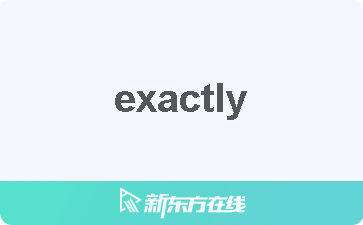exactly
[ADV]

1. 恰好
You use exactly before an amount, number, or position to emphasize that it is no more, no less, or no different from what you are stating.
近义词
precisely
双语例句
例:Each corner had a guard tower, each of which was exactly ten metres in height.
每个角都有1个警戒塔,每个塔刚好10米高。
2. 精确地 , 确切地
Exactly means in precise and correct detail. For example, if something is exactly the same as something else it is the same in every detail.
近义词
precisely
双语例句
例:Try to locate exactly where the smells are entering the room.
设法确定气味是从哪里进入房间的。
例:Both drugs will be exactly the same.
两种药将会完全一样。
例:No one knows exactly what these substances are.
没人确切知道这些物质是什么。
例:The results were exactly as Bohr and Heisenberg predicted.
结果确如波尔和赫森伯格所预测的那样。
3. 正是如此
If you say 'Exactly', you are agreeing with someone or emphasizing the truth of what they say. If you say 'Not exactly', you are telling them politely that they are wrong in part of what they are saying.
近义词
precisely
双语例句
例:Eve nodded, almost approvingly. 'Exactly.'
伊夫几近赞许地点点头。“正是如此。”
4. 不完全是
You use not exactly to indicate that a meaning or situation is slightly different from what people think or expect.
双语例句
例:He's not exactly homeless, he just hangs out in this park.
他不完全是无家可归,他只是常住在这个公园里。
5. 根本不 , 并非
You can use not exactly to show that you mean the opposite of what you are saying.
双语例句
例:This was not exactly what I wanted to hear.
这根本不是我想听的。
6. 到底(用于质问)
You use exactly with a question to show that you disapprove of what the person you are talking to is doing or saying.
近义词
双语例句
例:What exactly do you mean?
你到底什么意思?
7. 正好
You use exactly before a noun to emphasize that you are referring to that particular thing and no other, especially something that has a particular significance.
双语例句
例:These are exactly the people who do not vote.
这些正好是那些不投票的人。
ADV. 副词

关注新东方在线考雅课程中心
免费获取雅思备考资料包
雅思口语题库
扫码添加助教回复【口语题库】免费领取


 资料下载
资料下载
 公开课
公开课 编辑推荐
编辑推荐